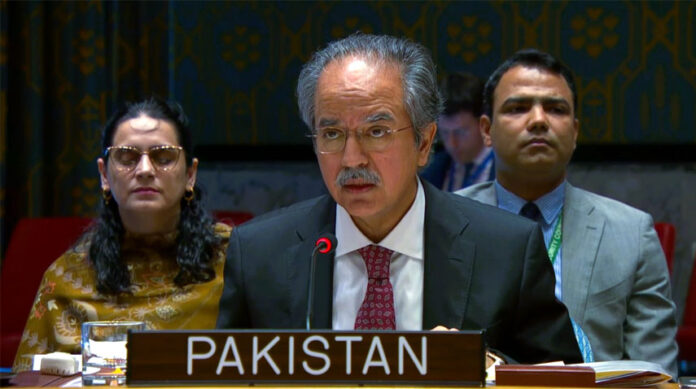UNITED NATIONS, Apr 29 (APP): Pakistan has called on the UN Security Council to “act decisively” to prevent new conflicts, resolve protracted ones, and promote the settlement of disputes in accordance with international law in an effort to deal with the global displacement crisis.
“A fundamental rethink is urgently needed,” Ambassador Asim Iftikhar Ahmad, permanent representative of Pakistan to the UN, told the 15-member Council at a briefing on the crisis that has reached “catastrophic proportions”, with more than 120 million people forcibly displaced worldwide.
“Forced displacement must be categorically rejected,” he said.
At the outset, UN High Commissioner for Refugees (UNHCR), Filippo Grandi, told Council members that thousands of lives have been “destroyed in the pursuit of supremacy”, as international humanitarian law has been “dismissed” and “cast aside”.
Grandi said in conflicts across the world in places like Sudan, Ukraine, Myanmar, the Democratic Republic of the Congo and Haiti, “violence has become the currency of our age.”
“Forcibly displaced people are among the first victims of war,” he said.
In his remarks, the Pakistani envoy stressed the need for operationalizing the principle of equitable burden- and responsibility-sharing, with timely humanitarian and development support to refugee-hosting countries delivered through grants, and donors boosting their financial contributions to UNHCR.
“We call on developed countries to establish multi-year resettlement plans with fixed quotas, ensuring that resettlement processes are efficient, predictable, and inclusive,” he said.
He underscored the need for prioritization voluntary repatriation and sustainable reintegration, with fully funded programmes, greater development aid to countries of origin, and investments in critical infrastructure in order to creating conditions for safe, dignified returns.
“Developing countries — many grappling with their own socio-economic challenges — continue to shoulder the greatest burden,” Ambassador Asim said, pointing out that developed nations, despite their far greater resources and moral obligations, have increasingly turned inward.
“Physical and political barriers have been erected, closing doors to those most in need,” the Pakistani envoy told the Council.
On its part, Pakistan has upheld a proud tradition of compassion and hospitality, hosting millions of Afghans, constituting one of the world’s largest and longest-standing refugee populations.
“Despite associated economic and security challenges, Pakistan has provided shelter, protection, and opportunities to millions of Afghans, beside facilitating the resettlement of Afghan citizens to third countries”.
Also, he said, millions of people displaced from Palestine, Syria, Yemen, and other conflict zones across the region, continue to await conditions conducive to voluntary, safe, and dignified return.
The ongoing conflict in Sudan has displaced millions within and beyond the country’s borders, with urgent efforts needed to end the violence and ensure humanitarian access and assistance, the Pakistani envoy said.
“Elsewhere, crises across Africa, Latin America, the Sahel or Europe further exacerbate the global displacement challenge”.
“While developing countries host 85% of the world’s refugees, many developed countries continue to shrink asylum spaces, tighten immigration policies, and reduce resettlement quotas,” Ambassador Asim said.”
“This is not burden-sharing; it is burden-shifting.”
Pakistan, he said, firmly believes that the path forward is clear: the primary drivers of displacement — unresolved conflicts, foreign occupations, and systematic denial of rights — must be addressed through the collective will and effective action of this Council and the international community.
“This duty is not merely a political obligation; it is a moral imperative that is deeply rooted in human history,” Ambassador Asim stressed, highlighting that it is also an Islamic tradition.
“As we confront today’s global refugee crisis, let us be guided and inspired by the exemplary responses from history based on acceptance not rejection, hope not indifference, and not walls but bridges of humanity,” the Pakistani envoy added.
APP/ift

